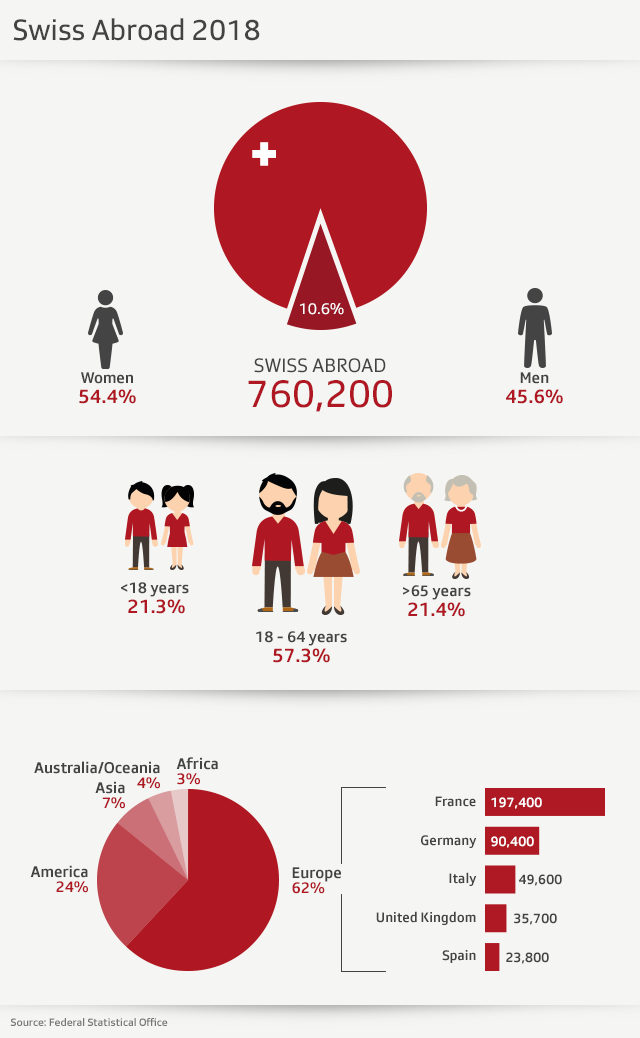Political parties woo expat voters ahead of elections

All five major political parties are courting the growing expat Swiss community using various strategies ahead of October’s parliamentary elections. One of the main concerns for the Swiss Abroad is the lack of an e-voting option.
So far, the Social Democrats have been the only political party hoping to attract public attention by launching their Swiss Abroad electoral campaign with a news conference.
“We want to be the leading party that takes into account increasing cross-border mobility,” Martin Naef, parliamentarian and co-vice president of the international chapter of the Social Democratic Party, told a news conference last week.
The left-wing group announced that 31 candidates living outside Switzerland – in Europe, Africa, the Americas and Asia – were running for a seat in the Bern-based parliament. The Social DemocratsExternal link also outlined a set of priorities for the expat Swiss community.
Domestic campaign
The leading party in Switzerland, the right-wing People’s PartyExternal link, does not foresee a major national publicity effort for its Swiss Abroad candidates, who number “about 25”. The party sent out a press release about the launch of its campaign in canton Graubünden last week and plans to proceed similarly in other cantons.
In addition, the national headquarters is also considering producing a series of online video messages, party officials said.
The People’s Party, like the Social Democrats, uses separate lists for expat candidates but also puts some Swiss Abroad hopefuls on regular domestic election lists.

As for the centre-right Radical-Liberal PartyExternal link, it has chosen a different approach and is not putting forward Swiss Abroad candidates at all.
“We don’t believe in purely symbolic public relations exercises using candidates who have no hope of winning,” says Roger Kölbener of the party’s international chapter. “But we have approved a special election manifesto. We are seeking as many senior domestic candidates as possible who are willing to defend the interests of the expatriate Swiss community.”
The manifesto includes five main points and bears striking resemblance to the concerns presented by the Social Democrats.
Top of the agenda is Switzerland’s future policy towards the European Union, home of more than 60% of expats with a Swiss passport. Other concerns include e-voting, the country’s consular network, banking ties and old age pensions. It’s a list of worries all too familiar for the Swiss communities abroad over the past decade.
Swiss Abroad Congress
For their part, the centrist Christian Democrats say they rely on their cantonal party sections to promote expatriate Swiss candidates. Discussions about election tactics are underway, according to a party spokesman, who says there is a chance that the international chapter of the Christian Democratic PartyExternal link will present a separate list in canton Ticino.
Among the big five Swiss parties, the Greens are the only group without an international section at its national headquarters.
Nevertheless, party officials say it is crucial that the voice of the expat Swiss community is heard and taken seriously. The Greens highlight their cooperation with like-minded parties in Europe, notably on climate, energy and economic issues. For the October elections, they present five expat Swiss candidates on a separate list in canton Geneva.
They also plan to take part – alongside their four rival parties – at the Congress of the Swiss Abroad in MontreuxExternal link in mid-August, to address the expat community and its some 180,000 registered potential voters (overall there were 760,000 Swiss Abroad at the end of 2018).
Empty handed
However, the Organisation of the Swiss AbroadExternal link (OSA), which hosts the annual meeting, suffered a serious blow earlier this year when it became clear that one of its key demands for the elections won’t be met.
The two providers of e-voting systems have withdrawn their online technology and the government has suspended its plans to set up a permanent e-vote option, which would complement the options of voting by postal mail or directly at the ballot box.
This leaves the organisation empty-handed. “The lack of an e-voting option increases the risk of the expatriate Swiss community no longer participating in Swiss politics. This is a serious setback,” says OSA director Ariane Rustichelli.
Limitations
The Swiss electoral system divides the country into 26 constituencies. Unlike France, Italy, or Portugal, citizens living outside Switzerland have no guaranteed seats in the parliamentary chambers – neither the House of Representatives nor the Senate.
And so, the candidates can only be elected in one of the 26 Swiss cantons. This was the case with Berlin-based Tim Guldimann, who succeeded on a canton Zurich list put forward by the Social Democratic Party. Elected in 2015, he stepped down before the end of the four-year term, citing family reasons.
Two other expatriates, Ruedi and Stephanie Baumann, who represented the Greens and Social Democrats respectively in the Swiss parliament from the 1990s to 2003, only emigrated to neighbouring France at the turn of the millennium.
The institutional hurdles make it virtually impossible for foreign residents to win a seat, unless the candidate is prominent enough in Switzerland – as was the case with Guldimann, a former top Swiss diplomat.
It is a fact that none of the expatriate Swiss candidates stands a real chance of getting elected on a special Swiss Abroad list, according to communications expert Mark BalsigerExternal link.
“Party strategists are aware of this situation and they know full well how to use the limited campaign budgets efficiently,” he says. “Of course, all the parties are flirting with the Swiss Abroad community but at the same time they do not make a great effort.”

More
Swiss in Boston discuss value of being heard in Bern

In compliance with the JTI standards
More: SWI swissinfo.ch certified by the Journalism Trust Initiative













You can find an overview of ongoing debates with our journalists here . Please join us!
If you want to start a conversation about a topic raised in this article or want to report factual errors, email us at english@swissinfo.ch.